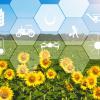
IIASA, the Food and Agriculture Organization of the United Nations (FAO), and the Environmental System Research Institute (ESRI) are proud to announce the launch of version 4 of the Global Agro-Ecological Zones platform (GAEZ v4) – a research tool that supports sustainable development in the agricultural sector – on the occasion of the World Day to Combat Desertification and Drought.
The 2030 Agenda for Sustainable Development puts a strong emphasis on the integrated approach to achieving Sustainable Development Goals (SDGs) that can harness synergies and minimize potential trade-offs, with land and water playing an important part in accelerating the achievement of many SDGs.
As the world population is expected to reach 9.8 billion people in 2050, more efforts and innovations are needed to sustainably increase agricultural production, improve the global supply chain, efficiently use irrigation water resources, adapt to climate change, decrease food losses and waste, and ensure that all who are suffering from hunger and malnutrition have access to nutritious food.
The Agro-Ecological Zones (AEZ) methodological approach assesses land and water resources relevant for agricultural production. It was collaboratively developed by IIASA and the FAO over several decades and the AEZ framework principles and outputs contribute directly to a number of SDGs. Rapid developments in information technology have produced increasingly detailed and manifold global databases, which made the first global AEZ assessment possible in 2000. Since then, Global AEZ assessments have been performed every few years.
“The agricultural sector plays a pivotal role in the land-water-energy nexus, amplified by climate change and biodiversity loss. Agro-ecological zoning provides a variety of global data necessary for research and the planning of sustainable land and water use, agricultural production, and climate change adaptation,” explains Sylvia Tramberend, coauthor of the updated GAEZ platform and researcher with the IIASA Water Security Research Group of the Biodiversity and Natural Resources Program.
This new version of the Global Agro-Ecological Zones (GAEZ v4) provides the agronomic backbone for various applications including the quantification of land productivity, as well as a variety of information on agricultural and rural investment. GAEZ v4 represents around 600,000 global layers at 9 km2 on land and water resources, agro-climatic resources, and crop-specific variables including agro-climatic potential yield, suitability and attainable yield, actual yields and production, and yield and production gaps.
“Agro-Ecological Zoning provides an excellent framework to promote innovations, sustainable development and ecosystem productivity in the agricultural sector at local to global levels,” says FAO Senior Environment Officer and Head of the FAO Geospatial Unit, Douglas Muchoney.
GAEZ v4 will be launched during an online event on 17 June, during which the functionality of the platform will be demonstrated in the context of sustainable development. The GAEZ v4 model documentation, user manual, and AEZ case studies will also be presented.
The launch of GAEZ v4 is part of the process of developing an open GAEZ v5 platform, in collaboration with various national, regional, and international partners, building interoperability between agriculture-related platforms, through the FAO Hand-in-Hand Initiative, and international and national efforts to mainstream sustainable agriculture into development agendas.
Further information:
GAEZ v4 Data Portal: https://gaez-data-portal-hqfao.hub.arcgis.com/
News

09 April 2024
Understanding the impacts of migration on the Austrian economy

08 April 2024
Reducing production and consumption growth in high-income countries: is it good for tackling climate change?

12 March 2024


